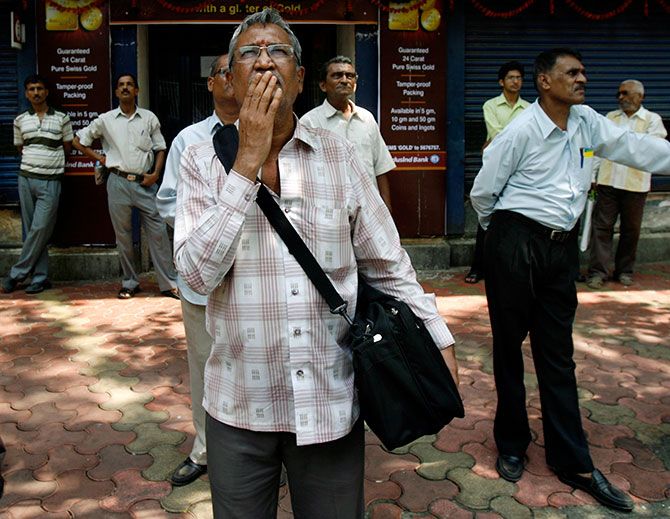'Market valuation is another concern.'
'India is trading at steep valuations and there have been a number of IPOs, especially in the insurance sector, that have had an impact on secondary market liquidity.'

After a sharp run-up in the mid-cap and small-cap stocks thus far in 2017, Hong Kong-based Mark Matthews, head of research for Asia, Julius Baer Group, tells Puneet Wadhwa that investors should watch out for the outcome of the Gujarat assembly election.
Has the market reaction to the rating rejig by Moody's been overdone?
There is no correlation between rating changes and the stock market.
Rating agencies have checklists for economic and corporate health that are more coincidental than leading. They tend to react to events that have already happened.
The rating agency action is not followed by stock market reaction, as most of the news is already factored in by then.
I don't think the rating upgrade for India by Moody's has any material impact.
Which other regions in the Asian region are you bullish on?
I am bullish on China. The stocks became quite volatile earlier this year, but I don't think the Chinese markets will fall more than three per cent from here on.
China's story is more or less like India given the crackdown on corruption and focus on manufacturing quality products instead of quantity.
That apart, China-A shares are available at an attractive valuation as compared to India.
All emerging markets (EMs), including China, have been treated as tactical markets by investors. Fund managers typically have two portions of their portfolio -- tactical and core.
While a core portfolio comprises countries and stocks that one buys all the time, a tactical portfolio is based more on the opportunities.
China now is becoming part of the core portfolio for global fund managers.
Is India core or tactical?
We don't treat India as part of our core portfolio. That said, we are always recommending investors to be in it. It is a good market to buy and hold.
What is your outlook for the Indian markets for the next year?
The plan to recap (recapitalise) PSBs (public sector banks) was definitely a good move by the government and should have long-term positive implications.
A sovereign upgrade by Moody's has also supported sentiment to some extent (though S&P did disappoint a bit as markets had started speculating on an upgrade from them as well).
The improvement in ratings of India in 'ease of doing business' is also a sentimental positive.
So overall, we continue to maintain a positive outlook on India and would look for any interim corrections (which could be more global driven) as opportunity to add positions.
What are the risks for investors?
One key risk is the outcome of the Gujarat assembly election.
While most people do not expect the Indian National Congress to win, a victory for them could see the markets easily tank 10 per cent.
At the global level, one needs to watch oil prices.
If oil was to stay above $60/barrel, investors will be worried about inflation and its impact on the economy.
Inflation in India is now being driven by vegetable prices and not crude oil.
Market valuation is another concern.
India is trading at steep valuations and there have been a number of IPOs (initial public offers), especially in the insurance sector, that have had an impact on secondary market liquidity.
Going ahead, foreign fund flow also needs to be watched.
Has the rally in bank stocks run its course?
FIIs (Foreign Institutional Investors) had been exiting Indian stocks till we saw the PSB recap plan.
The move rekindled investor interest in India and we have seen good FII flows since then.
I think it is a good idea to buy State Bank of India, Bank of Baroda and Punjab National Bank on any decline.
Even though it is still not clear as to who will get how much funds in the recap, the top three are likely to get the most.
While banks in the other countries are plays on interest rates, these three Indian banks are more a play on growth.
Which other sectors do you like?
I like materials and the rural consumer sectors. The government is giving a lot of thrust to affordable and rural housing which should augur well for these two sectors.
That apart, India had a normal monsoon. The economy is getting back to normal after demonetisation and the implementation of GST (goods and services tax) which should be beneficial for the banking sector as well.
The mid- and small-cap segments, however, are really frothy and I would not venture near them.
What are your key takeaways from the September quarter earnings?
The Q2FY18 (September quarter) numbers have turned out better than expectations, which could indicate that we could be close to the end of the earnings cut cycle that we have been witnessing over the last several quarters.
H2FY18 could be particularly good (at least optically) because of a favourable base (demonetisation impact).
If the market starts believing that we could now potentially get into an earnings upgrade cycle, it would be a big sentiment booster.
We expect around nine per cent growth in corporate earnings in FY19.
Photograph: Punit Paranjpe/Reuters










